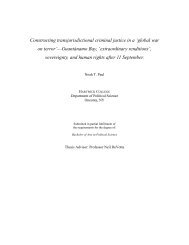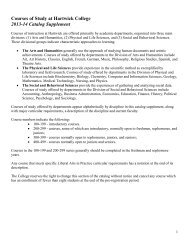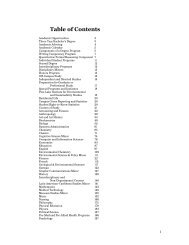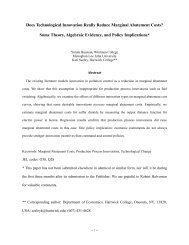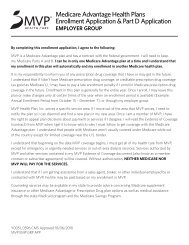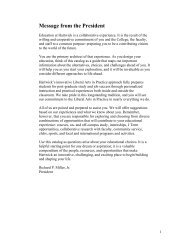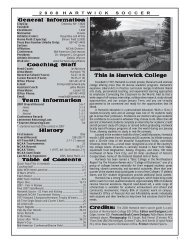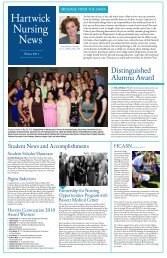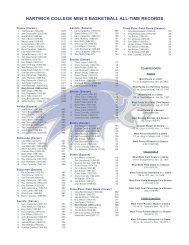Table of Contents - Hartwick College
Table of Contents - Hartwick College
Table of Contents - Hartwick College
You also want an ePaper? Increase the reach of your titles
YUMPU automatically turns print PDFs into web optimized ePapers that Google loves.
from employment, from serving an internship or from some other related<br />
activity. To obtain credit for prior experiential learning, applicants must<br />
be able to articulate in some acceptable way what they have learned and<br />
must be able to demonstrate that it is equivalent to the academic work<br />
done by college students. Normally, credit will be granted for experience<br />
occurring after the completion <strong>of</strong> high school.<br />
Students who have been accepted for admission by the <strong>College</strong> and who<br />
desire credit for prior experiential learning shall submit an application to<br />
the Registrar’s Office. The Registrar shall in turn submit the application to<br />
an academic department, to several departments or to the appropriate<br />
faculty committee for evaluation. The evaluation will include a personal<br />
interview and whatever form <strong>of</strong> demonstration is necessary to determine<br />
whether academic credit (without grades) should be awarded. Details <strong>of</strong><br />
this procedure and the fee charged for processing and assessing<br />
applications are available through the Registrar’s Office.<br />
No more than 30 credits for prior experiential learning may be included<br />
in credits required for graduation. No more than 60 credits earned<br />
through the combination <strong>of</strong> transfer credit, equivalency examinations and<br />
prior experiential learning may be applied toward a <strong>Hartwick</strong> degree.<br />
Courses Taken Elsewhere During Regular School Year<br />
Such study must be approved by the director <strong>of</strong> <strong>of</strong>f-campus programs<br />
and/or the Registrar. No more than 8 credits (semester hours) can be<br />
transferred to <strong>Hartwick</strong> from a two-year college after completing 60<br />
credits toward a <strong>Hartwick</strong> <strong>College</strong> degree (unless specific permission has<br />
been granted as part <strong>of</strong> an Individual Student Program). Grades for<br />
courses taken elsewhere are included when determining a student’s<br />
eligibility for honors at Commencement. See “Overall Average Honors”<br />
under Educational Policies and Procedures.<br />
Summer School Courses<br />
A <strong>Hartwick</strong> student may request permission from the Registrar to attend<br />
summer school at another accredited college or university. No more than<br />
8 credits in courses at a two-year college are permitted after two-years’<br />
work (60 credits or more) unless specific permission has been granted as<br />
part <strong>of</strong> an Individual Student Program. Grades for courses taken in<br />
summer school are included when determining a student’s eligibility for<br />
honors at Commencement (See “Overall Average Honors” under<br />
Educational Policies and Procedures). Quarter Credit hours convert to<br />
semester hours (credits) as follows: 3 quarter hours = 2 credits, 4 quarter<br />
hours = 2.66666 credits, 5 quarter hours = 3.33333 credits.<br />
Leave <strong>of</strong> Absence<br />
A leave <strong>of</strong> absence may be granted to a student for a period <strong>of</strong> not more<br />
than one year nor less than one term. There are three kinds <strong>of</strong> leaves:<br />
general, academic, and medical.<br />
General leaves are granted to students who need to take time away<br />
from their studies for financial, personal, or family reasons. A student<br />
desiring a general leave should consult with his or her advisor and then<br />
263



